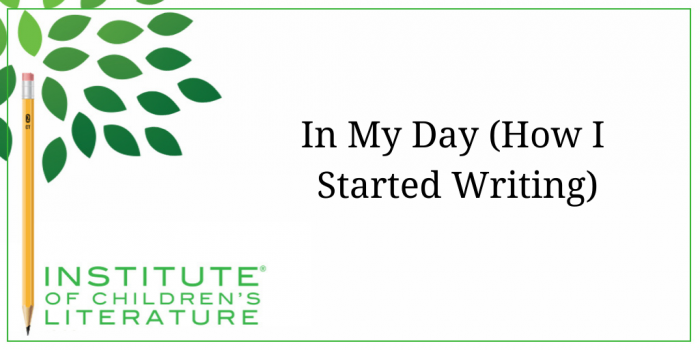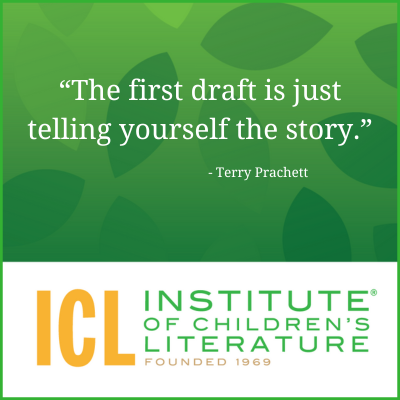1000 N. West Street #1200, Wilmington, DE 19801
© 2024 Direct Learning Systems, Inc. All rights reserved.

I became a writer mostly because it was something people had always told me that I did well. I knew that if a day came when I didn’t love writing, I would do something else. That day has never come, though I have taken some detours along the way. I started off writing for newspapers because that’s what I thought serious writers did. I basically didn’t know much.

So I started writing for magazines. This was back in the early 80s. I had to walk to the mailbox in the snow. Barefoot uphill both ways. Oh, right, sorry about that. There’s just something about a good “in my day” story that brings out the geezer in me. But some things were different when I began writing and selling to magazines, though many things remain the same.
First, I had a sad lack of money to buy sample magazines. Luckily my mother was a great lover of magazines so most of my first sales were to magazines that she read faithfully and kept forever. This let me read a year’s worth of a single magazine and come to know what they bought and ran in the magazine. It allowed me to notice who sold them a lot of articles and what those articles were like. And because I came to know the magazines so well, I sold my first articles with no writer’s market guide and no writer’s guidelines. I didn’t even know such things existed. But I knew the magazines and what they were running.
By reading a year’s worth of issues, I discovered that dozens of ideas popped into my head while I was reading, ideas for things that seemed exactly like what the magazine ran. I wrote down every one of those ideas. And I paid attention to format too: did the magazine use articles with subheadings? Did it use sidebars? What kind of approach did the articles take? Practical? Whimsical? Humorous?
I turned those ideas into queries and I mailed the queries to the editorial offices listed on the masthead of the magazine and to the editor that seemed most likely to be interested. I didn’t have other queries to pattern my approach after, only a memory of someone in Journalism school (a place where I very much did NOT learn how magazines work) mentioning that most magazines bought nonfiction based on queries, which were letters of proposal. I didn’t know what the letters were “supposed” to say, I only knew the magazines themselves. But I knew them well.
I got a lot of rejection letters, but I also got a surprising number of acceptance letters and I sold articles. I didn’t sell all the articles I could have. Sometimes, by the time an editor got back to me, an idea I’d had for an article no longer sounded like fun (remember, I was a good bit younger then) so I would let it fall by the wayside and never get back to the editor. I didn’t know how blindingly unprofessional that was, no one told me. All I had to go on was the magazines themselves.
And those magazines were amazing instructors. With no idea of correct submission procedures, I sold articles. The only reason I had any idea of correct manuscript format was because the format for submitting to a magazine was the same as for the stories I wrote for newspaper. I didn’t even know I wasn’t supposed to send illustrations for how-to articles, so I sent them, and they sold too! They sold because I knew what the magazine ran. Not from one issue but from a dozen. I knew from reading the issues cover to cover and asking myself each time: why did an editor buy this? And when I wanted to expand to selling to magazines beyond those my mother stockpiled, I turned to the library, a goldmine for magazine writers.
I would schedule whole days to nothing but sitting in a cozy chair in the library and reading magazines while taking notes. And along with the notes, I photocopied mastheads, because I still didn’t know anything about writer’s market books so I got my editorial office addresses and editor names from the magazines themselves. And I kept selling. I read all the magazines that my church had in its library, for adults and for kids. And I kept selling.
Then I started reading writing magazines because I had been selling for a while and thought maybe I might sell something to a writing magazine. That’s when I found out about market guides. So I bought one and learned about more magazines. And since reading magazines was always how I sold to them, I used the guidebook only as the first step and I went looking for who had those magazines so I could read them. And since I was poor, I was not above spending quality time reading magazines in bookstores while taking notes and buying only a small fraction of the magazines I had read.

Information even editors have trouble stating clearly. Information I cannot get anywhere but at the magazine itself.
Today, I also have another tool that I love. Something I cannot imagine being without. I have the Internet. And today, magazines are turning more and more to the Internet to connect with readers. I wouldn’t consider submitting to a magazine until I had done a diligent search to see if it has a web presence or to see if someone has written about it or about its editorial procedures. The Internet has saved me an incredible about of time and effort, but I still deal almost exclusively with magazines I’ve read and held in my hands. The connection, that place of having been a reader before being a writer, it’s a spot I don’t ever want to give up.
Your writing journey may be different from mine and it might not have any snow on the way to the mailbox, but if you’re still choosing your path. I wholeheartedly recommend putting serious reading time into knowing your market and I always will. It worked for me.
With over 100 books in publication, Jan Fields writes both chapter books for children and mystery novels for adults. She’s also known for a variety of experiences teaching writing, from one session SCBWI events to lengthier Highlights Foundation workshops to these blog posts for the Institute of Children’s Literature. As a former ICL instructor, Jan enjoys equipping writers for success in whatever way she can.
1000 N. West Street #1200, Wilmington, DE 19801
© 2024 Direct Learning Systems, Inc. All rights reserved.
1000 N. West Street #1200, Wilmington, DE 19801
© 2024 Direct Learning Systems, Inc. All rights reserved.
1000 N. West Street #1200, Wilmington, DE 19801
© 2024 Direct Learning Systems, Inc. All rights reserved.
1000 N. West Street #1200, Wilmington, DE 19801
© 2024 Direct Learning Systems, Inc. All rights reserved.

1000 N. West Street #1200, Wilmington, DE 19801
© 2025 Direct Learning Systems, Inc. All rights reserved.

1000 N. West Street #1200, Wilmington, DE 19801
©2025 Direct Learning Systems, Inc. All rights reserved. Privacy Policy.
1 Comment